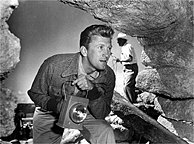The Daily Hypocrite
Today's hypocrite is a group called Fairness and Accuracy in Reporting. "FAIR"--you gotta love the acronym--describes itself as a "media watchdog group" and says it works "to invigorate the First Amendment by advocating for greater diversity in the press and by scrutinizing media practices that marginalize public interest, minority and dissenting viewpoints."
One "media practice" that FAIR hates is conflicts of interest caused by journalists taking money. No sir. Bad! Bad! Recently a group called Reporters Without Borders got some publicity for taking money from the U.S. government's National Endowment for the Democracy while endorsing policies that are also advocated by the U.S. government. There has been an immense hue and cry from (surprise! surprise!) media groups that don't like policies advocated by the U.S. government. RWB responded that it takes positions not advocated by the U.S. government, and that it is not a lot of money.
Well, FAIR--an ostensibly non-partisan media-watch group--thinks that's a lot of baloney. In an article that ran on the FAIR website the other day, the group said that "the real question is why it accepts money from a U.S. government institution when it regularly has to evaluate that government's treatment of journalists," particularly in Iraq. Said FAIR, "Saying that the money is only 1.6 percent of the group's budget only prompts the question of why the group doesn't forego such a minor part of its income in order to avoid a major conflict of interest."
If any of this may sound familiar--well, it should. A bunch of UN correspondents recently were found to have taken money from the UN, and their defense is that it is not a lot of money. As described in articles by Accuracy in Media and FrontPage Magazine, the UN paid NBC and National Public Radio journalist Linda Fasulo to write a book glorifying the UN, and also hired The Nation's UN correspondent Ian Williams to conduct media training for UN personnel and to write pamphlets and appear on a UN TV show.
Williams, a fourth-rate hack known for his knee-jerk defense of Kofi Annan, brazenly defends his unethical conduct--saying that his appearances on UN TV don't give him a lot of money and he doesn't always shill for the UN in his published work. (True, he only talks about his payola from UN TV and not any of his other work for the UN, but let's put that slipperiness aside for the moment.)
Well, FAIR is "fair," right? They have got to be really exercised over this, you would think--and you would be wrong. Even though UN correspondents taking money from the UN is a gross violation of journalism ethics--far worse that a journalism group taking money from a government-backed foundation--FAIR has said not word one about this controversy, and actually distributed one of Williams's rants on the UN as he was being picked over by AIM.
So congratulations, FAIR! You're our Hypocrite of the Day.
One "media practice" that FAIR hates is conflicts of interest caused by journalists taking money. No sir. Bad! Bad! Recently a group called Reporters Without Borders got some publicity for taking money from the U.S. government's National Endowment for the Democracy while endorsing policies that are also advocated by the U.S. government. There has been an immense hue and cry from (surprise! surprise!) media groups that don't like policies advocated by the U.S. government. RWB responded that it takes positions not advocated by the U.S. government, and that it is not a lot of money.
Well, FAIR--an ostensibly non-partisan media-watch group--thinks that's a lot of baloney. In an article that ran on the FAIR website the other day, the group said that "the real question is why it accepts money from a U.S. government institution when it regularly has to evaluate that government's treatment of journalists," particularly in Iraq. Said FAIR, "Saying that the money is only 1.6 percent of the group's budget only prompts the question of why the group doesn't forego such a minor part of its income in order to avoid a major conflict of interest."
If any of this may sound familiar--well, it should. A bunch of UN correspondents recently were found to have taken money from the UN, and their defense is that it is not a lot of money. As described in articles by Accuracy in Media and FrontPage Magazine, the UN paid NBC and National Public Radio journalist Linda Fasulo to write a book glorifying the UN, and also hired The Nation's UN correspondent Ian Williams to conduct media training for UN personnel and to write pamphlets and appear on a UN TV show.
Williams, a fourth-rate hack known for his knee-jerk defense of Kofi Annan, brazenly defends his unethical conduct--saying that his appearances on UN TV don't give him a lot of money and he doesn't always shill for the UN in his published work. (True, he only talks about his payola from UN TV and not any of his other work for the UN, but let's put that slipperiness aside for the moment.)
Well, FAIR is "fair," right? They have got to be really exercised over this, you would think--and you would be wrong. Even though UN correspondents taking money from the UN is a gross violation of journalism ethics--far worse that a journalism group taking money from a government-backed foundation--FAIR has said not word one about this controversy, and actually distributed one of Williams's rants on the UN as he was being picked over by AIM.
So congratulations, FAIR! You're our Hypocrite of the Day.


<< Home